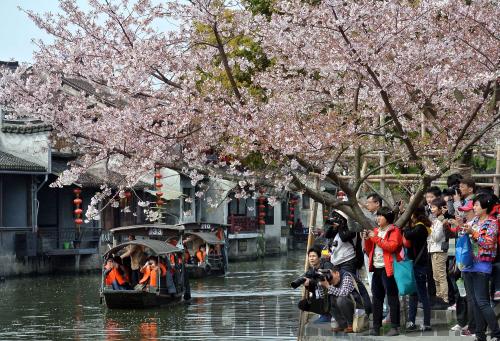|
 |
|
China's domestic travel market keeps booming (WANG SONG) |
Tourist rights
During the Labor Day holiday from April 29 to May 1 this year, high fees at many scenic and tourist sites again aroused the public concern. Earlier in the month, a local government declaration that an entrance fee of 148 yuanwould be charged for entry into Fenghuang town in Hunan province (an ancient town and very popular tourist destination) also triggered online debates.
The new tourism law stipulates that ticket prices and entrance fees for tourist sites can only be increased after compulsory public hearings held six months before ticket price changes are to be implemented.
The new law also lays out provisions to ensure that tourists' rights are protected. This is done by requiring that tour agencies provide detailed information about tours and respect tourist's rights. It also establisheslegal consequences for violating the rights and interests of tourists.
"One of the key aspects of the law is how it deals with the rights of tourists," said Tabel Rifai, the Secretary General of the United Nations World Tourism Organization, while praising the new Chinese tourism law. "In this regard, it complements existing legislation on consumer rights in China."
In recent decades, China has risen to become one of the most important players in the global tourism market, both as a destination and a source market. According to reports released by the China Tourism Academy, over 83 million Chinese nationals traveled to foreign countries in 2012. Meanwhile, the nation's domestic travel market has grown to become the world's largest. But it's widely believed that the nation's development in terms of tourist services and management lags behind this boom.
"China is a large country," said Zhang Lingyun, Professor at Beijing Union University, in an interview with China Radio International. "Culturally and naturally, we boast a variety of tourist attractions. We have good tourist destinations, but the service and management at these sites are bad," adding that China needs the new law to regulate its tourism industry to protect rights of the Chinese and foreign tourists.
Zhang added, "A good development model is based on mutual benefits, not on one side benefiting from the other's loss."
Experts noted that the protection of tourists through strengthened market regulation is a central piece of China 's new tourism law. While necessary, this will pose new challenges to travel agencies, and force them to adapt to operate under the new rules.
Guo Dongjie, Vice President of Ctrip, China's leading online travel agency, told Xinhua that the new law will inevitably lead to a reshuffling in the tourism industry, but he remains positive about the industry's future. "Illegal practices will be phased out, the cost of breaking the law will increase, and the market will return to being driven by benign competition."
In the tourism law
- Tourists have the right to know and choose tourist products and services, and refuse transactions by tourism operators.
- Local governments above the county level shall designate or establish a single tourist complaint acceptance authority.
- Travel organizations and persons receiving tourists shall not specify shopping locations, and tourism activities shall not be arranged on a surcharge basis.
- Ads used by travel agencies to attract tourists and tours organizers must be honest and accurate; no false advertising to mislead the tourists is allowed.
|